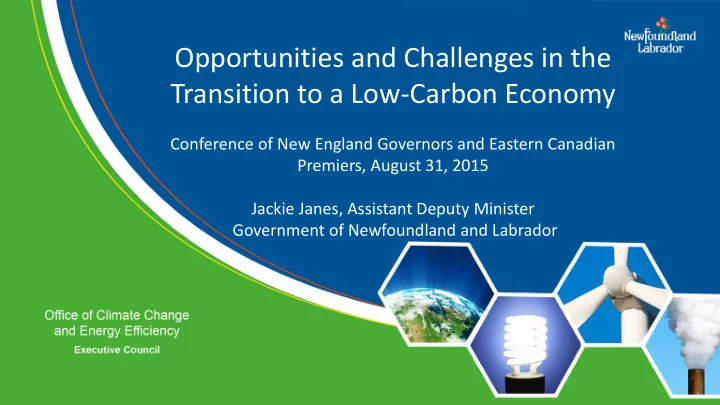

Opportunities and Challenges in the Transition to a Low-Carbon Economy Conference of New England Governors and Eastern Canadian Premiers, August 31, 2015 Jackie Janes, Assistant Deputy Minister Government of Newfoundland and Labrador
Agreement to limit temperature increase to 2°C Source: www.nature.com
This means living within the global carbon budget Source: World Resources Institute
Transformation of world’s energy systems is needed Source: International Energy Agency
Positive signs of potential to decouple GDP & GHGs Source: International Energy Agency
Stronger evidence of decoupling in NEG-ECP region Sources: Statistics Canada, Environment Canada, Environmental Protection Agency, Department of Economic Analysis
Growing coverage of carbon pricing
Increasing investment in low carbon technologies
Growing business confidence in a low-carbon future
Need to accelerate transition to low-carbon growth and prosperity Source: International Energy Agency
Scaling up innovation and technological change is key Source: International Energy Agency
Mobilize non-climate goals to promote GHG reductions Source: International Energy Agency
Opportunity to strengthen signal to markets • Over 190 countries to convene • 40,000 participants expected • Post-2020 legally-binding agreement
Conclusion • Strong synergies between policies needed to revitalize growth and improve well being, and those needed to address climate change • Positive signs…decoupling, technological advances, climate policies • States and provinces are key drivers of innovation • Substantive returns on low-carbon investment but more investment is needed • INDCs currently insufficient to keep under 2°C, must be floors not ceilings • Paris is not an end point but it is an important step
Thank You Jackie Janes Assistant Deputy Minister Office of Climate Change and Energy Efficiency Government of Newfoundland and Labrador 709-729-1210 | jackiejanes@gov.nl.ca
Recommend
More recommend